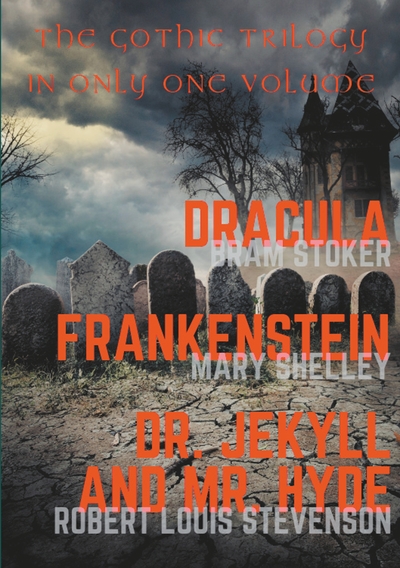Nous utilisons des cookies pour améliorer votre expérience. Pour nous conformer à la nouvelle directive sur la vie privée, nous devons demander votre consentement à l’utilisation de ces cookies. En savoir plus.
Dracula, Frankenstein, Dr. Jekyll and Mr. Hyde
Books On Demand - EAN : 9782322152278
Édition papier
EAN : 9782322152278
Paru le : 1 mars 2019
25,00 €
23,70 €
Disponible
Pour connaître votre prix et commander, identifiez-vous
Notre engagement qualité
-
 Livraison gratuite
Livraison gratuite
en France sans minimum
de commande -
 Manquants maintenus
Manquants maintenus
en commande
automatiquement -
 Un interlocuteur
Un interlocuteur
unique pour toutes
vos commandes -
 Toutes les licences
Toutes les licences
numériques du marché
au tarif éditeur -
 Assistance téléphonique
Assistance téléphonique
personalisée sur le
numérique -
 Service client
Service client
Du Lundi au vendredi
de 9h à 18h
- EAN13 : 9782322152278
- Réf. éditeur : 038313
- Editeur : Books On Demand
- Date Parution : 1 mars 2019
- Disponibilite : Disponible
- Barème de remise : NS
- Nombre de pages : 688
- Format : H:210 mm L:148 mm
- Poids : 982gr
- Résumé : The Gothic Trilogy : Dracula, Frankenstein, Dr. Jekyll and Mr. Hyde (unabridged versions) in one volume ! Three Classic Gothic Novels in One Book only ! 1) Dracula, 2) Frankenstein, 3) Dr. Jekyll and Mr. Hyde --all three classics complete and unabridged versions by Bram Stoker, Mary Shelley and Robert Louis Stevenson. 1) Dracula is an 1897 Gothic horror novel by Irish author Bram Stoker. It introduced the character of Count Dracula, and established many conventions of subsequent vampire fantasy. The novel tells the story of Dracula's attempt to move from Transylvania to England so that he may find new blood and spread the undead curse, and of the battle between Dracula and a small group of men and a woman led by Professor Abraham Van Helsing. Dracula has been assigned to many literary genres including vampire literature, horror fiction, the gothic novel, and invasion literature. The novel has spawned numerous theatrical, film, and television interpretations. 2) Frankenstein; or, The Modern Prometheus is a novel written by English author Mary Shelley (1797-1851) that tells the story of Victor Frankenstein, a young scientist who creates a hideous, sapient creature in an unorthodox scientific experiment. Frankenstein is infused with elements of the Gothic novel and the Romantic movement. At the same time, it is an early example of science fiction. Brian Aldiss has argued that it should be considered the first true science fiction story because, in contrast to previous stories with fantastical elements resembling those of later science fiction, the central character "makes a deliberate decision" and "turns to modern experiments in the laboratory" to achieve fantastic results. It has had a considerable influence in literature and popular culture and spawned a complete genre of horror stories, films and plays. 3) Strange Case of Dr Jekyll and Mr Hyde is a gothic novella by Scottish author Robert Louis Stevenson, first published in 1886. The work is also known as The Strange Case of Dr Jekyll and Mr Hyde, Dr Jekyll and Mr Hyde, or simply Jekyll & Hyde. It is about a London legal practitioner named Gabriel John Utterson who investigates strange occurrences between his old friend, Dr Henry Jekyll, and the evil Edward Hyde. The novella's impact is such that it has become a part of the language, with the phrase "Jekyll and Hyde" entering the vernacular to refer to people with an unpredictably dual nature: usually very good, but sometimes shockingly evil.
- Biographie : Bram Stoker (1847-1912) was born in Dublin. After attending Dublin University, he spent ten years as an Irish civil servant, trying to keep up his writing in his free time. By 1871, he had become the drama critic for the Dublin Mail and had gained experience as a newspaper editor, reporter, and short story writer. In 1878 he became the personal assistant to Sir Henry Irving, the foremost Shakespearean actor of his day, accompanying him on tours and managing Irving's theater. After Irving's death in 1905, Stoker worked on the literary staff of the London Telegraph. Dracula, his most famous work, was published in 1897.











